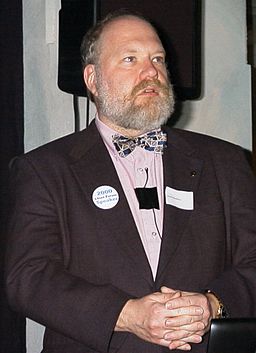
Wikipedia: http://en.wikipedia.org/wiki/Gene_Spafford
Babbage Institute: https://wiki.umn.edu/CBI_ComputerSecurity/PeopleSpaffordEugene
Spaf's home page at Purdue: http://spaf.cerias.purdue.edu/index.html
Spaf's Firsts: http://spaf.cerias.purdue.edu/firsts.html
Silver Bullet Podcast: http://www.cigital.com/silver-bullet/show-018/
Security Weekly Podcast: http://wiki.securityweekly.com/wiki/index.php/Episode318#Interview:_Dr._Gene_Spafford
About.me page: https://about.me/spaf
Twitter feeds:
https://twitter.com/RobotSpaf Stream of stories on cyber security, privacy and crime.
https://twitter.com/TheRealSpaf Gene Spafford is a homunculus of possible extraterrestrial origin, tilting at windmills.
From the retired Babbage Institute wiki:
"Eugene "Spaf" Spafford is a computer scientist and computer security expert who is the founder and director of the Center for Education and Research in Information Assurance and Security (CERIAS) at Purdue University and the current editor of Computers & Security, the oldest journal in the field of information security. CERIAS is the largest academic research center on information assurance and computer security and has had tremendous influence on the field from its pioneer research and education to its highly regarded symposiums and outreach. Spafford has received numerous awards for his work on computer security, including the 2007 ACM President's Award and induction into the National Cyber Security Hall of Fame. He has also consulted with major companies and government agencies including Microsoft, Intel, the NSA and the FBI.
"Spafford received his Ph.D. in Information and Computer Science from Georgia Institute of Technology in 1986 and was hired as an Assistant Professor of Computer Sciences at Purdue University the following year. His initial research at Purdue involved software testing, but a general interest in computer security combined with his work examining the 1988 spread and subsequent consequences of Morris Worm led Spafford into the computer security field full-time. The Robert Morris Worm (or "Internet Worm") infected one of the Purdue servers that Spafford used, and he and several colleagues created and distributed a patch that helped stop the worm. Following his investigation, Spafford published the paper "The Internet Worm: Crisis and Aftermath" in Communications of the ACM, which gained attention in the computer security community.
"Spafford founded the COAST (Computer Operations, Audit, and Security Technology) Laboratory within Purdue's Computer Science department in 1991, with funding from Sun Microsystems, Microsoft, and other companies. COAST grew slowly over the next several years as other Purdue faculty got involved. The laboratory was then subsumed into CERIAS when the latter was founded in 1998. CERIAS was created as a department-level entity with initial funding from the Lily Endowment, who contributed $4.9 million over the first three years. Spafford and CERIAS then began to enlist a number of private companies in strategic partnerships that involved shared research."
Inducted into the (US) National Cyber Security Hall of Fame 2013 http://www.cybersecurityhalloffame.com/
From the Cyber Security Hall of Fame page:
Professor of CS @ Purdue University
"Eugene H. Spafford is one of the most recognized leaders in the field of computing. Dr. Eugene Spafford is a professor with an appointment in Computer Science at Purdue University, where he has been a member of the faculty since 1987.
"He is a senior advisor and consultant on issues of security and intelligence, education, and policy to a number of major companies, academic and government agencies, including Microsoft, Intel, Unisys, the US Air Force, the NSA, the GAO, the FBI, the NSF, the DoJ, the DoE, and two Presidents of the United States."
Comments (0)
You don't have permission to comment on this page.